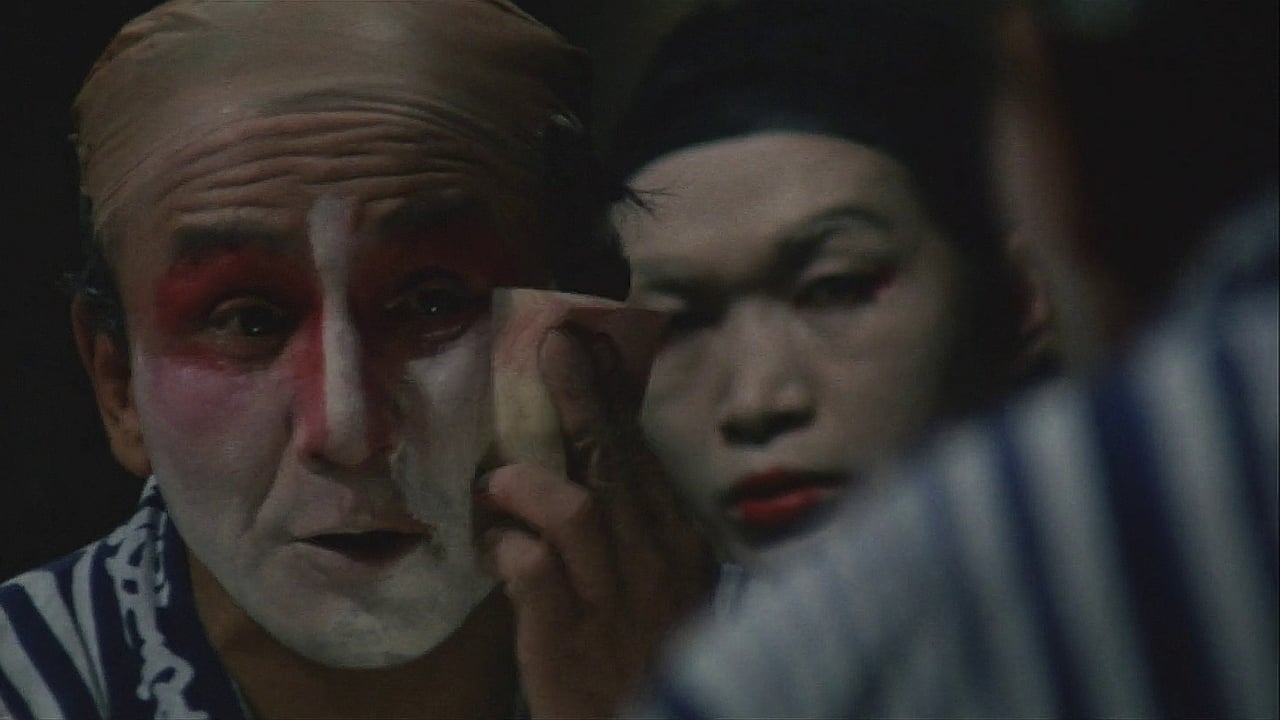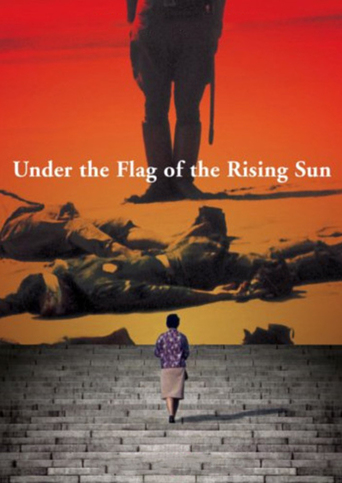

Under the Flag of the Rising Sun is one of those Japanese movies about WW2 that harshly critique militarism, war atrocities and the mindset of the people involved in it. It was produced independently by Fukasaku and based on the novel by Shoji Yuki, and tells the story of a widow trying to piece together the puzzle of her soldier husband's death on the front.The filming style here is really something to behold. There are many war flashbacks that alternate from color to black and white, normal image to inverted colors, still stock images to live action scenes that often accentuate their shots as still pictures themselves and slow motion scenes of excessive violence among soldiers. Most of this is set to a dramatic orchestral soundtrack, often combined with Dutch angles and Fukasaku's trademark shaky cam. Connecting flashbacks with present time is also common, like in the scene where the retired veteran takes a walk with his granddaughter, and meets two characters, one in the flashback, the other in present time, the change between two times being accompanied by the change from monochrome to color.The acting is very believable and adds to the strong atmosphere of the movie (fun fact - this is the second time actor Noboru Mitani has to play a poor man living in a garbage-filled shanty, the first time is in Dodes'ka-den). Like most post-war Japanese films that tell about the war itself, it's very solemn, dark and with a negative portrayal of, name it, the government, the Emperor, the soldiers, the post-war society refusing to care about the veterans, and of the horrors of war in general.
... View MoreDirector Fukasaku is best known for his cult classic Battle Royale, as well as numerous yakuza flicks from the '70s. Under the Flag of the Rising Sun is really the film he should best be known for. He produced it independently, and it's easily his most prestigious and all-around exceptional film. It's a WWII movie, made from the perspective of a quarter century later. Sachiko Hidari stars as a war widow in 1971 who is still trying to get benefits from the government, as well as restore her husband's honor. He was supposedly executed in the waning days of the war, but any further information has disappeared. To find the truth, she begins searching for veterans who may have known her husband. She interviews several witnesses who give her a conflicting story of her husband, but a pretty vivid picture of what it might have been like to be a soldier fighting in the New Guinea front. The film isn't exploitative, but it can be explicitly violent (most of the flashbacks are in black and white up until the violence starts - Fukasaku does not want the audience to be separate from that). Under the Flag of the Rising Sun is one of the most unflinching of all the great Japanese WWII films. You really feel the pain that still exists in the early '70s. The sequences with the war veteran teacher, watching over his students who have grown up after the war and are completely innocent of it, are especially gut-wrenching. I also loved the performance of Noboru Mitani, best known for playing the irresponsible homeless father in Kurosawa's Dodeskaden, who plays a veteran with a dark secret.
... View MoreIf Japanese war films are snubbed in the West, that's not done on any political grounds. The Japanese are not only the first to condemn the rigid militarism that brought them to the brink of complete destruction following WWII but the only ones to offer that condemnation against Emperor and Generals in such a scathing manner. If you won't find films like this or THE BATTLE OF OKINAWA mentioned in the same lists as their Vietnam-war American counterparts like APOCALYPSE NOW, it has to do with the same cultural reasons that keep Japanese (or French and Italian) crime films in the shadow while Scorsese, Tarantino and their cohorts reap all the glory.And even when the spotlight falls on the individual, the lowly Japanese soldier haphazardly trained in a few weeks time and sent with meager provisions to conquer New Guinea, the Philippines, or Indonesia in the name of the 'Motherland', the focus is not on a heroic celebration of courage and valor because these men where not heroes and what courage they showed in the face of death was instilled in them by the fear of worse things like malaria and malnutrition or even worse, the fear of their superiors executing them for cowardice, but on grim endurance beyond all hope and glory with nothing else to look forward to but returning home to a wartorn devastated country. The chaos squalor and misery of postwar Japan Kinji Fukasaku knows firsthand. It's the place and time he grew up in and the memory of that misery would resurface regularly in his films as a bleak backdrop to the yakuza films through which he became known and for which he never received the acclaim he deserved.This is the greatest success of UNDER THE FLAG OF THE RISING SUN. Not the narrative maze of the script carrying echoes of RASHOMON and even CITIZEN KANE that has the wife of an executed soldier trying to piece together the life and death of her husband in New Guinea through the memories of his surviving comrades and superiors. It's the hopelessness and savagery of men trying to survive like beasts in the jungle, this relived in a booming 1960's modern Japan by the survivors in the form of flashbacks, that sets apart films like this and Kon Ichikawa's FIRES IN THE PLAIN from their American counterparts. Major battle scenes and historic events are in the background, presented in Fukasaku's trademark quick montages using stock photos. It's the day-to-day tragic struggle for survival for which there is no glory to be had that pucks the real punch and it's enough of a punch to make you ignore the problematic script or poor handling of exposition. In the end, one of the survivors living in a garbage-strewn shantytown outside of Tokyo, bemoans not the misery and destruction of postwar Japan but its rapid economic growth that has no room for scarred veterans like him. Vietnam veterans of 30 years later would relate.
... View MoreIf you are thinking of watching this, you need to know what your are getting into first. This is a violent movie, in the extreme.I do not ordinarily watch violent movies. But I am glad I watched this one, even though I had to turn away a few times. The subject matter is about violence, and the director pulls no punches.It is so easy to romanticize war, either in victory or defeat. This movie clearly has a message for the Japanese people about WWII that the director intends them never to forget. That it was received so well, speaks well of the Japanese people's honesty. And it has a message for her Asian neighbors who suffered at the hands of Japanese soldiers, that perhaps hate is no longer appropriate.Viewing it as an American, I was struck by how different the image is from that of the well-disciplined soldier presented almost as a polite stereotype in Hollywood movies. An American director could not have gotten away with such a movie. However, I can't help wondering if this is perhaps not exactly a representative view of what Japanese soldiers went through.The movie is told very effectively through its plot, following the inquiries of the war widow into the death of her husband. As the truth comes out, it hits you in the gut much as it would have hit this widow.At the same time, the director apparently did not intend for this film to be viewed too narrowly as an antiwar movie. It is not just about war, and it is not just about Japanese soldiers, it is about human beings, and what any of us might do in similar circumstances.
... View More